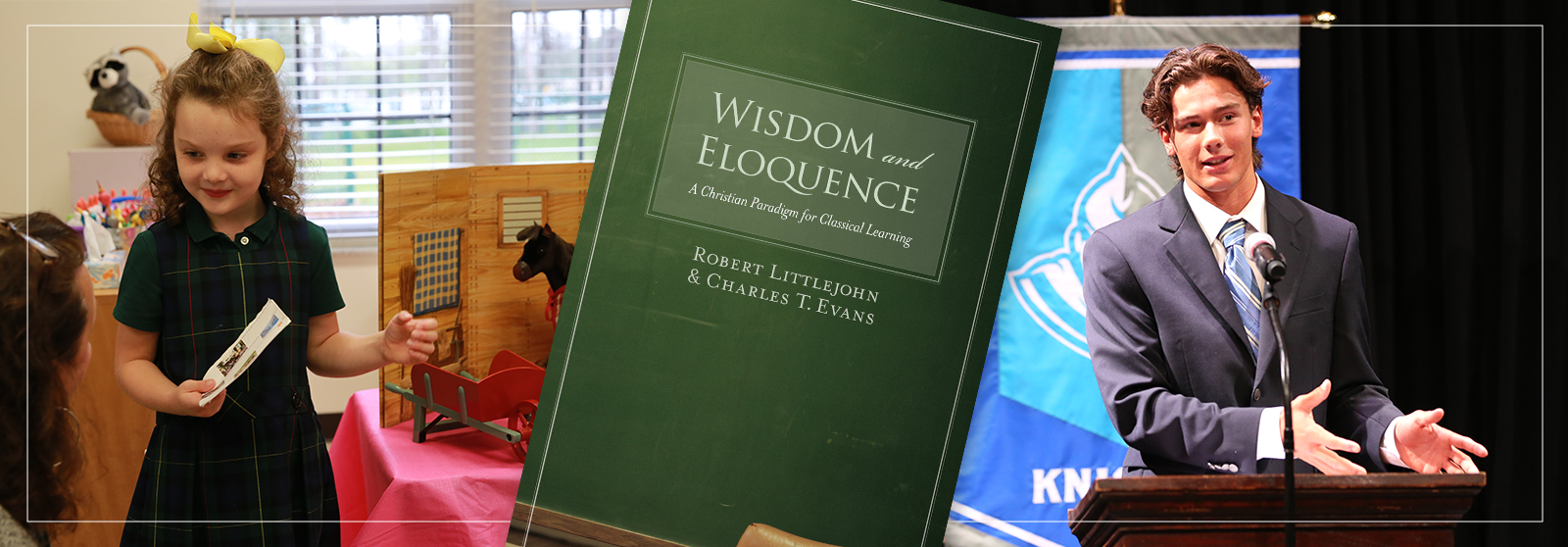Wisdom and Eloquence: Worldview and Formation
By Christina Walker
In this series of blog posts that explore the book Wisdom and Eloquence by Robert Littlejohn and Charles T. Evans, we have discussed why Christian classical education is an effective model to educate and equip students to be culture shapers, especially after graduating from Geneva. In a previous post, we discussed how Geneva uses reliable and time-tested methods of teaching that build a foundation for wisdom and help lead to eloquent graduates.
Worldview and Formation
The word worldview is, like many words, sometimes misunderstood. As we discuss chapter three of the book, worldview means more than “holding ‘biblical’ positions” on issues that we face in our lives and culture. Quoting Littlejohn and Evans, worldview is “that inner honing device that colors everything we think, feel, and do . . . [it] is central to our sense of being and is a function of our culture and upbringing” (p. 44).
For better or worse, a child’s worldview is mostly shaped and developed by the way his or her parents live their lives, what we would call enculturation. Enculturation happens because parents, teachers, coaches, club leaders, youth group leaders, and many others influence children day to day. Purposeful and active enculturation is formation, and teachers as well as many other individuals join parents in this critical endeavor. This purposeful and active effort on the part of teachers is the “work of spiritual, cultural, and intellectual formation” (p.44). Paideia (or formal instruction) and nouthesia (modeling godly wisdom when opportunities arise) are both crucial elements as teachers at Geneva strive to help students understand that our beliefs about God, his Word, and the Christian life matter for everything we do, think, and say. These beliefs become “that inner honing device.”
There is no part of creation that lies outside of God’s control and sovereign possession. Sometimes, we don’t appreciate this truth. But the reality of God’s sovereignty is comforting.
God is the one
who made heaven and earth,
the sea, and all that is in them,
who keeps faith forever (Psalm 146:6).
who created the heavens and stretched them out,
who spread out the earth and what comes from it,
who gives breath to the people on it
and spirit to those who walk in it (Isaiah 42:5).
And because these things are true, we can be confident:
For I am sure that neither death nor life, nor angels nor rulers, nor things present nor things to come, nor powers, nor height nor depth, nor anything else in all creation, will be able to separate us from the love of God in Christ Jesus our Lord (Romans 8:38, 39).
When we all—parents, teachers, staff, and students—acknowledge and internalize these truths, Christ-centered formation begins to happen.
Knowing that each student is made in the image of God also helps teachers to see and value each student as one of his children, which leads to rich opportunities for discipleship as well as teaching. What a gift and responsibility to draw out and help refine the creative nature of each student and to know that each one is “worthy of respect and is deserving of the challenge to manifest his God-given talents to the Creator’s glory,” as Littlejohn and Evans beautifully put it (p. 45).
As believers, we want to take the things that we believe, especially the fundamental, foundational things, and use and apply those beliefs as we (try to!) live consistent and faithful lives aided by the Holy Spirit. A biblical worldview can be very helpful, but we must constantly bring our worldview humbly before Christ and strive to “take every thought captive to obey Christ” (2 Corinthians 10:5).
We do well to remember that “the line between good and evil more often runs through things, ideas, and people (including ourselves) instead of running between them” (p. 50). We must remain humble, knowing and acknowledging that even our best efforts are affected by the Fall and the brokenness of the world and our own selves. Reading and praying, discussing and being in community help us to be receptive and open as the Holy Spirit works in us and through us.
Along with day-to-day enculturation and formation, Geneva also offers formal classes for upper school students to fine tune, discuss, and develop a cohesive and thoughtful worldview. Eleventh graders take Worldview Analysis, which gives students an opportunity to discern how various worldviews show up in their lives through media and how other worldviews and faiths compare and contrast with Christianity. In twelfth grade, students “revisit biblical themes and explore how Christianity need not take a back seat in the marketplace of ideas.” These classes help students realize that all ideas “have consequences for how we live our lives and how we understand human flourishing; students are also able to articulate a statement of faith.”


